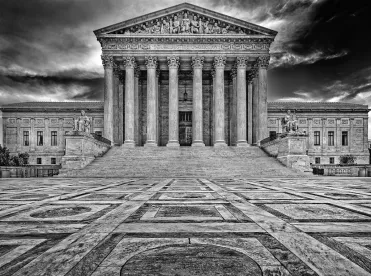In a 5-4 opinion issued Wednesday in Oklahoma v. Castro Huerta, No. 21-429, the Supreme Court expanded the authority of States to exercise criminal jurisdiction over non-Natives in Indian country without tribal consent or congressional authorization, upending a long-standing basic principle of Federal Indian Law and striking a blow to tribal sovereignty. Under federal law, “Indian country” has been interpreted as including Indian reservations, dependent Indian communities, Indian allotments, In Lieu sites (land outside reservation boundaries meant to replace lost Indian lands), and tribal trust lands. The majority opinion in Castro-Huerta, written by Justice Brett Kavanaugh, held that States presumptively have “inherent” jurisdiction over crimes committed in Indian country and “do not need a permission slip from Congress to exercise their sovereign authority,” dismissing the Court’s prior statements to the contrary as non-binding dicta. After concluding States presumptively have criminal jurisdiction in Indian country, the majority found that the General Crimes Act, 18 U.S.C. 1152, did not preempt that jurisdiction for crimes committed by non-Natives against Natives in Indian country. As a result, States now have concurrent criminal jurisdiction with the federal government to prosecute crimes committed by non-Natives against Natives in Indian country.
Castro-Huerta involved the prosecution of Defendant Victor Manuel Castro-Huerta, who was convicted in an Oklahoma State court of a crime against a Native child. Following the Supreme Court’s landmark decision in McGirt v. Oklahoma, 140 S. Ct. 2452 (2020), in which the Court concluded much of Oklahoma is Indian country, Castro-Huerta successfully argued that the State lacked jurisdiction to prosecute him because he committed his crime in Indian country. The State appellate court’s decision in Castro-Huerta’s favor followed the interpretation of the General Crimes Act that has prevailed since the statute’s 1948 reenactment. Under that interpretation, only the federal government has authority to prosecute non-Native individuals who commit crimes against Native individuals in Indian country.
Arguing before the Supreme Court, Oklahoma claimed that the prevailing interpretation is incorrect, and the majority agreed. The Court began its analysis by describing the details of Castro-Huerta’s crime and noting that of the 2 million people who live in Oklahoma, “the vast majority are not Indians.” Op. at 2. The Court also noted that Castro-Huerta had accepted a plea agreement with the federal government for a 7-year sentence followed by removal from the United States (he was in the United States unlawfully), receiving, in effect, a 28-year reduction in his sentence. Op. at 3. The majority stated that his case “exemplifies a now-familiar pattern in Oklahoma in the wake of McGirt” in which non-Indian criminals have received “lighter sentences in plea deals negotiated with the Federal Government” or have “simply gone free.” Op. at 3-4.
Citing the United States Constitution and prior Supreme Court decisions for the proposition that Indian reservations are “part of the surrounding State” and subject to State jurisdiction except as forbidden by federal law, the majority concluded that an “overarching jurisdictional principle dating back to the 1800s” is that “States have jurisdiction to prosecute crimes committed in Indian country unless preempted.” Op. at 5-6.
The majority then considered whether the State’s authority to prosecute non-Native v. Native crimes in Indian country had been preempted under the “ordinary principles of federal preemption” or because “the exercise of state jurisdiction would unlawfully infringe on tribal self-government.” Op. at 7. The majority found that the plain text of the General Crimes Act did not expressly provide for exclusive federal jurisdiction. Op. at 7-14. It then rejected Castro-Huerta’s argument that Public-Law 83-280 and similar statutes through which Congress authorized certain States to exercise jurisdiction in Indian country demonstrated Congress’s understanding that States presumptively lack such authority. The majority reasoned that, despite what Congress might have assumed, the question had not yet been decided and the statutes in question lacked language preempting State jurisdiction. Op. at 16-18. The statutes also provided for civil jurisdiction and State jurisdiction over Natives, in addition to criminal jurisdiction over non-Natives, so they were not entirely redundant.
Turning next to whether the exercise of State jurisdiction under the General Crimes Act would unlawfully infringe on tribal self-government, the majority applied the “Bracker balancing test,” which weighs tribal, federal, and state interests, and is generally used to determine whether a state tax is preempted when assessed against a non-Native on tribal land. The majority concluded that the Bracker factors supported State jurisdiction, dismissing any tribal preference for federal jurisdiction as irrelevant to the Court’s analysis, Op. 19 n.6, Op. 20 n. 7. Concluding the State’s inherent jurisdiction had not been preempted, the majority noted in its holding that, “Unless preempted, States may exercise jurisdiction to prosecute crimes committed by non-Indians against Indians in Indian country,” and this “applies throughout the United States,” including on Indian allotments. Op. 24 n.9.
In a scathing dissent, Justice Gorsuch, joined by Justices Breyer, Sotomayor, and Kagan, pushed back against the majority’s opinion, suggesting any future analysis would need to consider the specific context of each tribe, its treaties, and relevant laws. Dissent at 40-41 n.10. The dissent, appealing for a legislative fix, accused the majority of ignoring history, congressional action, precedent, and tribal sovereignty, and usurping “congressional decisions about the appropriate balance between federal, tribal, and state interests.” Dissent at 38.



 />i
/>i

